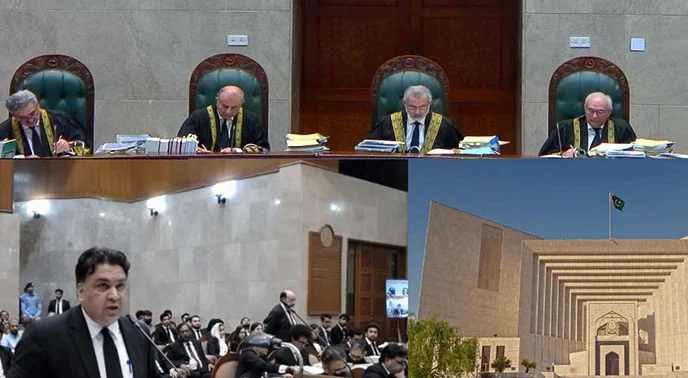Islamabad (Web Desk): The Supreme Court (SC) on Tuesday reserved the verdict on Sunni Ittehad Council’s (SIC) plea against denial of reserved seats for women and minorities in the national and provincial assemblies.
A full court 13-member bench, headed by Chief Justice of Pakistan (CJP) Qazi Faez Isa and comprising Justice Syed Mansoor Ali Shah, Justice Muneeb Akhtar, Justice Yahya Afridi, Justice Amin-ud-Din Khan, Justice Jamal Khan Mandokhail, Justice Muhammad Ali Mazhar, Justice Ayesha A Malik, Justice Athar Minallah, Justice Syed Hassan Azhar Rizvi, Justice Shahid Waheed, Justice Irfan Saadat Khan and Justice Naeem Akhtar Afghan, heard the petition.
The proceedings were broadcast live on the SC’s website and its YouTube channel.
The top court announced that the reserved verdict on the SIC case will be announced after consultation.
During the hearing, Barrister Salman Akram Raja and SIC’s Faisal Siddiqui presented their arguements.
Faisal Siddiqui argued that Balochistan Awami Party (BAP) participated in general elections of 2018 but didn’t win a single seat but it was given three reserved seats.
He said that the Election Commission of Pakistan (ECP) didn’t take decision regarding BAP as per the law. He said that Jamiat Ulema e Islam (JUI-F) was also given reserved seats of minorities.
The CJP inquired that whether only Sunni community was entitled to join the SIC to which the lawyer said that every Muslim individual could join it.
Faisal Siddiqui said that 30 reserved seats were given in Khyber Pakhtunkhwa Assembly in 2024. He said that Pakistan Muslim League-Nawaz (PML-N) won two seats in KPK and given five reserved seats against it.
He said that whether a party with 18 general seats should be given 30 reserved seats.
Addressing the lawyer, CJP Isa said : “According to your logic, you should get zero seats because SIC did not win any seat.” The CJP said “You are giving arguments in the case of Pakistan Tehreek-e-Insaaf (PTI) but arguing against yourself.”
Faisal Siddiqui said that the reserved seats should be given to SIC which was in Parliament.
Justice Athar Minallah remarked that it was important to make the elections transparent. “The situation is that a major political party got the vote which was excluded from the electoral process,” he said, adding “It is not about the political party but about the people’s right to vote.”
Justice Athar Minallah said that Hamid Raza was PTI’s nominee before the decision of the bat symbol, adding that the ECP misinterpreted the verdict, which led to the controversy.
Salman Akram Raja, the lawyer of independents, argued that the candidates associated with PTI were declared as independent. He claimed that the ECP didn’t present the complete documents to the court.
The lawyer said that the independent candidates joined the SIC within three days after which the SIC became a parliamentary party. He said that the ECP told the candidates that the PTI tickets would not be accepted after which the ticket of PTI Nazriati was submitted. “We had no other option,” he said.
He said “We wanted to give the people the right to vote for whichever party they want.”
The CJP remarked that first the candidate gave a declaration of PTI Nazriati, then PTI and now they were asking to join the SIC. “Tell us which party you belong to,” he questioned.
Salman Akram Raja Advocate said that Kanwal Shuzab was from PTI and would join the SIC.
After the lawyers concluded their arguments, the court reserved its judgment.
It is pertinent to mention that following the February 8 elections, PTI-backed independent candidates joined SIC after the PTI lost its electoral symbol 'bat' due to a ruling by the apex court.
The ECP withdrew PTI’s electoral symbol, a move ratified by the Supreme Court.
The electoral body, in a 4-1 verdict ruled in March that SIC could not claim reserved seats due to significant legal flaws and failure to submit a mandatory party list for such seats.
Later, the electoral body redistributed these seats among other parliamentary parties, benefiting primarily Pakistan Muslim League-Nawaz (PML-N) and Pakistan Peoples Party (PPP) with 16 and five additional seats respectively, while Jamiat Ulma-e Islam (JUI-F) received four seats. PTI rejected this verdict as unconstitutional.
In the same month, the Peshawar High Court (PHC) dismissed an SIC plea challenging the ECP's decision to deny them reserved seats.
On May 6, a three-member Supreme Court bench, led by Justice Mansoor Ali Shah and including Justice Muhammad Ali Mazhar and Justice Athar Minallah, suspended the PHC decision. The case was then referred to a larger bench due to its constitutional implications.
In late May, a full court had been constituted to hear the case, comprising all judges except Justice Musarrat Hilali.
As the case was taken up on June 3, Justice Mandokhail had noted that the public did not vote for independent candidates but those nominated by the PTI in the February 8 general elections.
Meanwhile, Justice Shah suggested that the controversy could be ended if the ECP gave the formerly independent candidate another three days to decide afresh whether to join another political party.
On June 22, the ECP justified its decision to deny reserved seats to SIC for women and non-Muslims through a statement submitted by Senior Counsel Sikandar Bashir Mohmand to the Supreme Court.
The electoral body argued that SIC did not qualify for reserved seats as it did not meet the constitutional criteria of being a political party under Articles 51(6)(d), 56(6)(e), and 106(3)(c) of the Constitution.
Additionally, SIC failed to submit a timely priority list (Form 66) for reserved seats as required by the election program.
The ECP also pointed out that Article 3 of SIC's constitution restricted party membership to adult Muslims only, which contradicted constitutional provisions on freedom of association, freedom to profess religion, and equality of citizens (Articles 17, 20, and 25).


